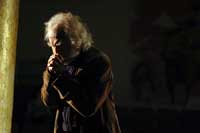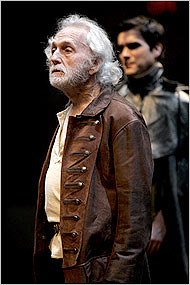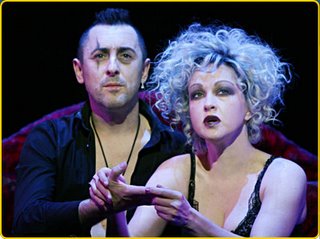Someone (thanks, Ashley) has tipped me off to two articles that have run this year in "Crain's New York Business" which constitute the best reporting so far on the decimation of commercial Off-Broadway. Miriam Kreinin Souccar there has been on the case since January and has proven once again that the more revealing arts reporting often is to be found in the "business press," or at least on the Business pages.
If you have Nexis-Lexis--or keep a shelf of Crain's back issues, like I know you do!--Souccar's pieces are from January 16 and June 5 of this year. Otherwise, lacking link access, let me quote some highlights without crossing the line into outright illicit wholesale reprinting.
First, though: this being a business perspective for a business readership, the point of view in this coverage is the producer's, naturally. Hence a slight distortion that all theatre Off Broadway is in jeopardy, and only passing reference to nonprofit companies as part of the problem, poaching from these producers' product and ticket sales.
...[T]he growth of regional theater in New York's bedroom communities is taking away some of the people who used to rely on off-Broadway for serious theater. New York's burgeoning nonprofit theater industry, which is cushioned by donors, is siphoning off audiences as well.
"Burgeoning" in what way, I wonder. I can imagine more than a few Artistic Directors whose response to that would be, "Where can I find these cushioning donors!" It's hard to see our LORT theatres (many often running deficits) as "winners" in all this. And truth is, I'm not sure commercial Off-Broadway has been a source of much "serious" theatre for quite a while. (As Souccar points out the two aberrant runaway successes remain the indefatigable Stomp and Slava's Snowshow.) Still, for the more artistically-minded independent producer the nonprofits of course present competition for ticket sales.
It's also important that much of the commercial off-Broadway "hits" of recent years actually emerged from those upstart nonprofits. I'm thinking of
Gross Indecency and
Shakespeare's R & J, for instance, which came out of very small downtown companies. Donald Margulies'
Dinner with Friends, was one of the last major plays (in this case a Pulitzer winner) to have a commercial NY premiere--even though it began in that regional hub South Coast Rep...The days when the little 200-seat houses of the West Village were brimming with the latest by Albee, Shepard, or Fugard are long behind us. The next generation of writers is much more comfortable with the support apparatus a good Artistic Director and a nonprofit company provide.
A healthy commercial Off-B'way scene would be one where the
producers do more of the poaching, giving promising small shows a chance at longer life after they sell out their 3-week run at the resident companies. This is the ideal "transfer" for most serious new plays. Without viable rental houses like the Promenade or the Perry Street, a show must be able to survive the 1000-seat capacity demands and $90+ ticket-price expectations of Broadway if it is to enjoy an extended or open-ended run. This vanishing of the "midlevel transfer" marks a major change in the landscape of New York theatre.
So you don't have to be a moneyman (or moneymiss) to care about the question: can small theatrical productions still be profitable? After all, some playwrights might have a stake in that, too.
What a good business reporter like Souccar can provide is the hard data.
While there is no entity to track box-office receipts for off-Broadway, producers say attendance at most shows has been hovering at around 55%. Most tickets are being purchased at a discount at the last minute.
[...]
Once considered a cheaper alternative to the high costs of Broadway, the average off-Broadway show now costs more than $500,000 to produce. One of the problems is that, in order to cover rising costs and attract investors, producers need to set ticket prices at $50 to $65. That's around the same amount many discounted tickets go for on Broadway. To attract audiences at all, off-Broadway producers need to offer their own discounts, leaving them without the money to cover weekly expenses.
In other words, Broadway is still the main competitor--and threat--to Off. And when the ticket costs the same, the customer says "What's the dif?" (The new "little" musical
Burleigh Grimes, for instance, actually advertises a $70 ticket.) If it's too high for the "layman" (especially if they don't at least get to see a movie star) then forget about other theatre artists, who are more predisposed to "support" smaller new work. At least nonprofits offer more in the way of discounts (subscriptions, student rates, rush tix) or, frankly, comps--or "pay what you can"
nights to the theatre community. So who's left buying tickets for these shows other than disgruntled tourists who know next to nothing about the show and would rather be seeing Julia Roberts.
Stomp and
Slava's Snowshow have thrived because they are "unique theatrical experiences" which are just odd enough to not fit on B'way but just user friendly enough to please millions. (They also don't require any knowledge of English.)
So $500,000 is what the average small Off-B'way show costs to mount these days. Sorry to state the obvious, but that's half a million. I remember when a million-dollar capitalization was still unheard of on Broadway, except for musicals. Now add weekly operating costs including rent. (Souccar cites the 140-seat Manhattan Ensemble Theatre going at $20,000 a month now. So another 5,000 a week there.)
Now do the math: a house of 199-399 seats, filling at an average of 55% capacity = 100-200 tickets sold @ $50-65 = $5,000-10,000 intake a night. And that's probably a good night. If you actually are lucky to repeat that eight shows a week, you could potentially get up to $80,000 a week. Again, definitely a maximum. And that can be even with good reviews. Souccar doesn't even go into the the typical operating costs (like, uh, paying the actors), but you can imagine those cutting into any net gain pretty fast. (Theatre entrepreneurs among you, please feel free to flesh out the figures in Comments, below.)
All this is not to lament the lot of the theatre capitalist, but just to show what it takes. Nonprofits actually have to deal within the same parameters--but you can see how presold subscriptions can make a big difference. Plus, they don't have to, what do they call it--profit.
And Producers are definitely not the only victim of these empty, soon to be demolished, venues. There's the professional artists who could be earning salaries there (even if it's beating a "Drumstruck" drum and other non-verbal tourist-pleasing quasi-theatrics). And then there's the audiences for whom these theatres were neighborhood nightspots.
[R]replacing the old neighborhood playhouses with new theater complexes has changed the face of off-Broadway. Many of the houses closing now are anchored in residential neighborhoods, where they have attracted visitors to the area.
"The small theaters that have been the lifeblood of off-Broadway theater, we're losing the charm they bring to neighborhoods,'' says Scott Morfee, who runs the Barrow Street Theater in the West Village. ``Once you lose something that is part of the fabric of the community, it's hard to get it back.''
You can imagine what's replacing them:
Still, with real estate at a premium, developers are trying to dislodge theaters wherever they can. Daryl Roth, a producer with two theaters, has seen an increase in calls from tenants who want to take her spaces, especially her Daryl Roth Theater, housed in a landmark bank building on Union Square."Over the last few months, I've had inquiries from three restraunteur and two retailers,'' Ms. Roth says. "But right now I'm holding on.''
Many don't have that choice. David Fishelson, artistic director of the Manhattan Ensemble Theater in SoHo, spent the last year looking for another theater company to take over his lease for the 140-seat space, but couldn't find anyone able to pay the monthly $20,000 rent his landlord wanted. Instead, Mr. Fishelson is helping his landlord find a restaurant to take over the lease. "I have to destroy my beautiful theater,'' he says.
The script is similar at playhouses throughout the city. The Perry Street Theatre was always given a good deal on rent from its landlord, the Trace Foundation. Now, the foundation is rumored to be selling the three-story building to a family that wants to put up a single home in its place. The foundation didn't return calls for comment.
The Lamb's Theatre has been housed in a building on West 44th Street owned by the Church of the Nazarene since 1979. The church is selling the turn-of-the-century building to the Hampshire Hotels Group.
Sources say the Century Center [off Union Square] is being sold to a church, but the theater didn't return calls for comment.
Damn churches. But seriously, if you think theatre is elitist, what impact will more luxury homes and exclusionary restaurants have on these neighborhoods? One of the shames of this real estate grab is that the proper heirs to Off-Broadway (which, notice, I invoke in the past tense) are the current nonprofits--and they're not able to bid on these spaces. Eduardo Machado--in his
much-blogged recent harangue--still has no home for his INTAR theatre after rejecting a plan to move his progressive Hispanic collective into the ground floor of a luxury high-rise. Such prominent companies as the New Group also have no "home"; a small theatre devoted to adventurous new writing could fit quite nicely into one of these residential neighborhoods, building a strong subscriber base from among its neighbors.
That the problem is bigger than quaint outdated proscenium houses is obvious from the troubles of even the new kids on the gentrified block are feeling the chill:
As off-Broadway continues to decline, even the midtown theaters are struggling. At New World Stages, two of the five theaters are dark. The Little Shubert has been empty since a planned production slated for last January fell apart. And within the next couple of weeks, 37 Arts will have three empty stages.
For those of you playing at home, "New World" used to be the much ballyhooed Dodger Stages, which that gang dumped after lackluster tenants and a big merger. The Little Shubert seemed a promising investment in Off-Broadway by the "big boys", especially when they took a chance on importing the brilliant
Shockheaded Peter there. But even that show couldn't fill the house for long and couldn't lower ticket prices enough for its core audience of young folk. And 37 Arts started auspiciously last summer with a transfer of the New Group's excellent "Hurlyburly" but now has become a overgrown standup venue for limited-engagements by visiting comedians Billy Connelly and Lee Evans.
If you're wondering about the very successful Theatre Row...it's actually a nonprofit entity. (Plus they had a box office meltdown last Friday and totally lost my ticket order for New Group's "Jayson with a Y" last Friday night, along with hundreds of other patrons all crowded in their claustrophobic lobby....Okay, that's a more personal gripe.)
So it's not the end of the world. But I do think it's the end (or beginning of the end) of Off Broadway as we know it. Or as our parents knew it. The nonprofits will be survivors of this evolutionary extinction. But how will they adapt to the harsh post-dinosaur environment?
 King Lear
King Lear












